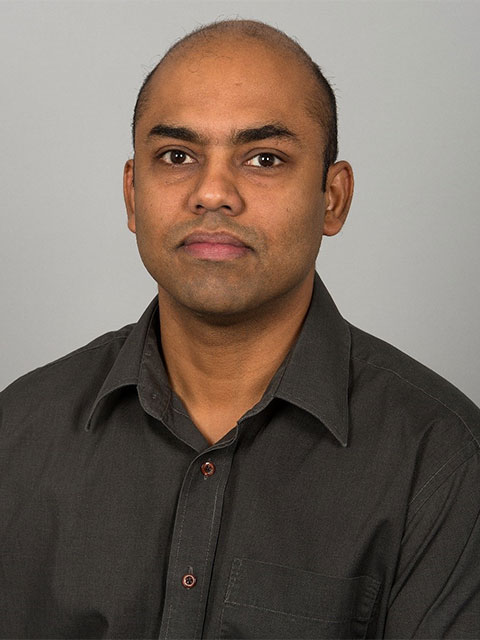Background
Anish Roy received his B.Tech honours from the Indian Institute of Technology, Kharagpur, in 1999. Following a short stint as a software development engineer at IBM India, he pursued further studies and received his MS in Civil and Environmental Engineering and a PhD in Computational Science and Engineering both from Carnegie Mellon University, USA. Subsequently, he was a post-doctoral researcher at Eindhoven University of Technology, The Netherlands, from 2005 to 2007.
He was a Research and Development Engineer at The DOW Chemical Company in the Netherlands. He moved to the UK to take a Lectureship position at the university in 2009. Since 2019, he has been a Professor of Mechanics of Materials and Processes.
Professor Roy has a sustained record of publications in leading journals. He has attracted significant research funding and maintains a thriving research program with international collaboration.
He is the current Chair of the Applied Mechanics Group of the Institute of Physics (IoP). He is a Chartered Engineer, a member of IMechE and IoP, and a Fellow of the Higher Education Academy.
Awards
Graduate Student Scholarship, Carnegie Mellon University 2001-2005
Main research interests
Professor Roy’s research interests are in the areas of hybrid machining, numerical modelling of machining processes across spatio-temporal scales, continuum mechanics and computational sciences.
Machining Processes
Professor Roy has established expertise in the hybrid machining of intractable materials. He has been responsible for the Ultrasonically Assisted Machining (UAM) laboratory since 2009.
Notable research contribution in UAM has been in:
- Robotic drilling in composite stacks
- Machining of Metal Matrix Composites with the assistance of laser heating
- Drilling of carbon/epoxy aerospace composites, which show reduced damage and significantly less drilling force and torque with the use of ultrasonic assistance
- Turning in Ti alloys and Ni superalloys with reduced machining forces and an improvement in surface finish
- Development of Hot UAM - this has been used to show further improvements in the machining of Ti alloysCutting in bio-tissues using a blade fixture that is vibrated at ultrasonic frequencies. This is used in histology.
- Polymer processing using ultrasonic excitation.
Across all of these case studies, understanding the underlying process is of great importance, as this can help improve the overall manufacturing practices. Additionally, this knowledge will feed into developing accurate theories that represent the material deformation process when subjected to high-frequency vibrations.
Mechanics: Theory and Computation
Crystal Plasticity: One of Professor Roy’s research thrusts has been in contributing to the development of theories of plastic deformation in crystalline solids at small scales. The main challenges of predicting material behaviour at this scale is the accurate representation of stress fields and the plastic strains that arise from the temporal evolution of underlying crystalline defects. His research strives to bring us closer to this goal across length scales. A phenomenological model of mesoscale Field Dislocation Mechanics was developed, extending continuum plasticity theory for studying initial-boundary value problems of small-scale plasticity (as part of PhD studies at CMU). Finite element method-based computational predictions of the theory demonstrate some of the well-known characteristics of plasticity at small scales.
Materials
Professor Roy’s research into mechanics of materials and processes span a range of materials. These include single crystals metals (such as copper, silicon and titanium); polycrystalline materials; non-crystalline alloys (Cu-Zr based metallic glass); composites (metal-matrix composites, carbon-fibre plastics, natural fibre composites); ceramics (6H-silicon carbide) and soft tissues. Each material class, require a unique treatment of its deformation behaviour.
Grants and contracts
PI:
- Manufacture with Pulsed-Electric Mechano-Vibratory Machining (EP/T005041/1). ERSRC 2019-23. Value: £250k. Adventurous Manufacturing Call
- H2 Manufacturing: Hybrid-Hybrid machining of next generation aerospace materials (EP/P027563/1) [PI & Lead Partner]. EPSRC 2017-21. Total £977k. Partners: Uni. of Manchester, Uni. of Sheffield (The AMRC)
- Digitally enabled ultrasonic assisted robotic machining demonstrator – RoboMade (96515-565224). IUK 2018-20. Total: £1M+. Partners: The MTC, Loop Technologies, Far UK, Insphere, Sandvik
- Ultrasonic microtome blade for improved histological section quality ULTRATOME. IUK (105-17). Total Value: £243k to LU. Partners: CellPath, Hilsonic
- Development of a new polymer leak free ultrasonic flow enhancement in injection moulding – Ultramelt. IUK (2015-16). Value: £200k to LU. Partners: The Technology Research Center, Hilsonic, Luxus, Barkley Plastics
- Teaching Grant: Learning Aids in Mechanics of Modern Materials. The higher education academy (2010-12). Value: £2.5k.
Co-I:
- Dislocation-Microstructure Interaction at a Crack Tip - In Search of a Driving Force for Short Crack Growth, EPSRC (2014-19). Total: £1M+. Partners: Manchester, Southampton, Rolls-Royce, Alstom, dstl, SPS
- MAST: Modelling of advanced materials for simulation of transformative manufacturing processes [Co-I, main grant writer and Project Manager]. UK-India Project. EPSRC (2014-17). Total: £700k (UK fund component). Partners: Oxford, IIT Delhi, IIT Guwahati, IISc Bangalore, The MTC, Thompson Friction welding, GoIndi group
- TAMER: Trans-Atlantic Micromechanics Evolving Research. EU (2014-18). Total: £193k. Partners: USA, Poland, Ukraine, Italy, Belarus, Russia.
Current teaching responsibilities
2nd year undergraduate core module and a postgraduate (MSc) module for Mechanical Engineering.
Module Code: WSB100 (Mechanics of Materials: 2). Core module for Mechanical Engineering
Module Code: WSP102 (Experimental Mechanics). Core module for the MSc Mechanical Engineering Program. This module was co-created and launched with a colleague.
Current administrative responsibilities
Associate Dean of Research and Innovation, Wolfson School
